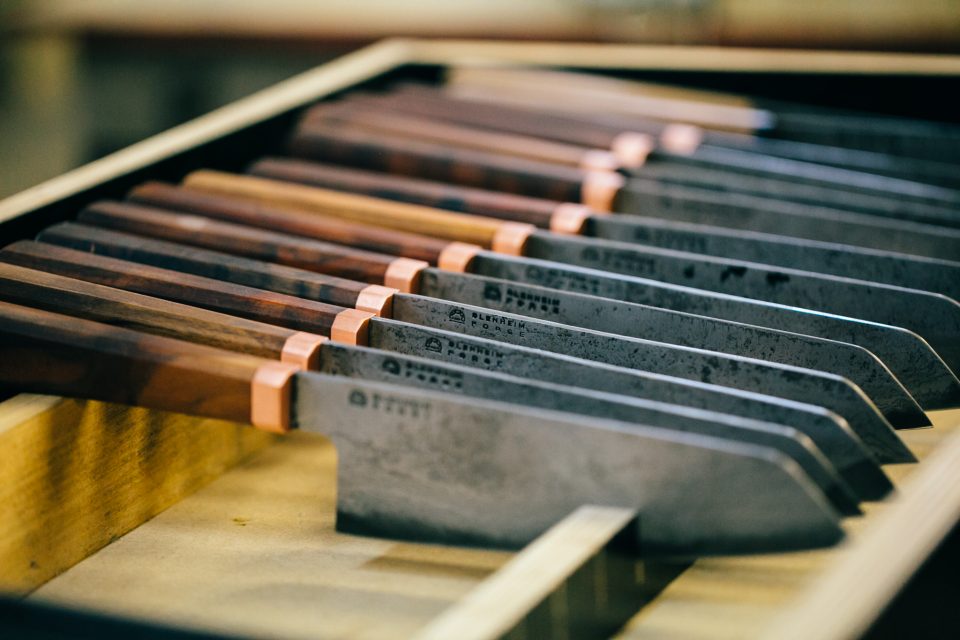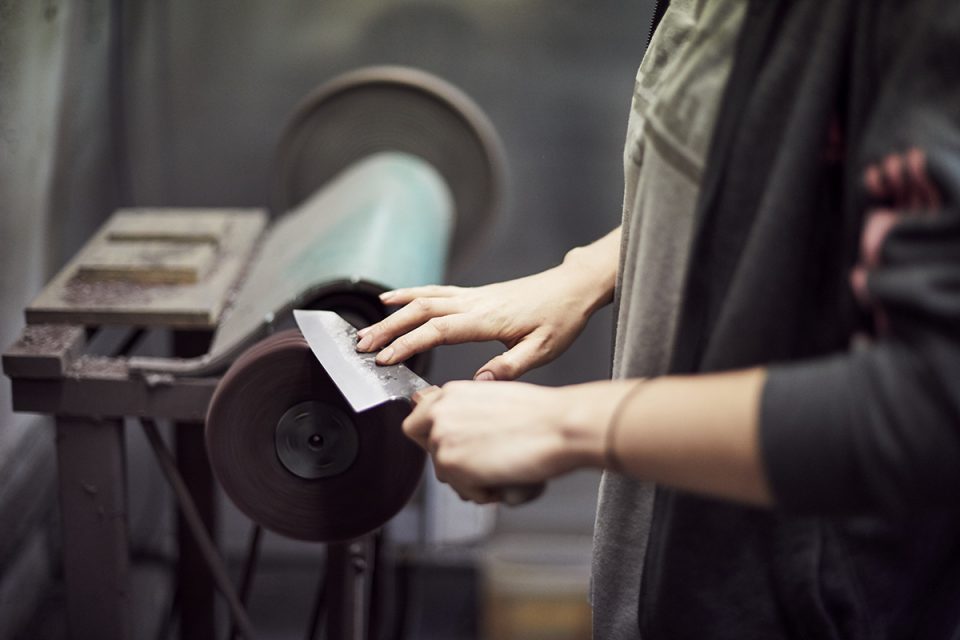Meet Blenheim Forge, the blacksmiths supplying quality kitchen knives to London’s top chefs

TUCKED away in a railway arch beneath Peckham train station lies a workshop. Here, the blacksmiths of Blenheim Forge toil away making kitchen knives. But these are not just any old blades. These are handcrafted Japanese-style knives – and the cheapest model starts at £160.
There’s no better endorsement for a product than knowing who buys it. Blenheim Forge counts celebrity chefs James Martin, Mark Hix, and Francis Mallman among its clientele, and recently sold a set of knives worth nearly £30,000 to be displayed in one of Gordon Ramsay’s restaurants.
The business was founded by James Ross-Harris (pictured) and Jon Warshawsky back in 2014, who were working as blacksmiths for a different company inside the same South London workshop where Blenheim Forge is now based, making furniture, clocks, and all sorts of other things.
Weekend hobby
Ross-Harris, who originally studied design engineering, came across a process online for folding different steels together, and started experimenting with making kitchen knives.
“Me and Jon set up a forge in our back garden to start with, using it in the evenings and on weekends, messing around making rather rough-looking knives,” he recalls. “My bosses decided to move out of the workshop, and to me it seemed like too good an opportunity to let it pass by.
Read more: The boss of the Mexican food chain Chilango talks about the virtues of crowdfunding
“It’s such a great space for doing what we do. We’re within London, but tucked away without too many neighbours. It’s got a nice outside space, which is perfect for forging. We had to take it when the opportunity came up. As we were doing the knives already, we thought ‘let’s try and see if we can make a living from it’.”
Fast-forward five years, and what started as a weekend hobby has become a thriving business. Blenheim Forge produces around 40 of its high-end knives a week, and generated revenue of over £350,000 last year.
Around the forge
When I meet Ross-Harris in person, he looks exactly as one might imagine a blacksmith, complete with a slight dusting of soot. He gives me a tour of the forge, and shows me some of the company’s more unusual orders, including a “noodle knife” – which looks like a clothes iron and is used to chop and separate noodles – and a “tuna sword” – a long, slightly curved blade for slicing off flesh from large fish.

While these and the other knives look incredible, I ask why they come with such a hefty price tag – given that you can buy a complete set of “chef’s knives” from Amazon for £55.
“With knives, there’s a trade-off between durability, ease of care, and the way it performs,” Ross-Harris explains. “People do need to understand what they’re buying into – it’s a precision tool and needs to be treated in a certain way. But if you understand that then you can get a great knife which will massively outperform any mass-produced blade.”
More than meets the eye
While the UK’s dining scene is going through a downturn – it was just last month that Jamie Oliver’s restaurant empire collapsed into administration – this hasn’t impacted Blenheim Forge. In fact, its products are increasingly popular with chefs, and it has become a trend to collect high-quality knives from a range of producers.
“More young chefs are getting into buying fancy knives. Three or four years ago, the idea of spending over £100 on a knife, even to a lot of chefs, would have been a fairly alien concept. They were used to just buying plastic handled stainless-steel blades that were disposable. Now, people are much less shocked by it and much more familiar with the idea of spending money on a really high quality blade, especially young chefs.

“There’s a huge amount of variation within kitchen knives – something that to the untrained eye can look quite similar to one another. Young chefs want to get a range of knives and build a collection. Within the restaurant trade, it’s picking up for us all the time.”
Read more: That’s a wrap! Tortilla’s boss, Richard Morris, talks about the business of burritos
Looking abroad
Although the UK is its main market, Blenheim Forge doesn’t just sell at home. Its products are popular around the world, and are sought by knife-enthusiasts and collectors as well as chefs and home cooks.
“Over the last few years, we’ve sold a huge amount of knives in Norway. We’re beginning to work with a couple of resellers in the United States and we’re getting picked up by American collectors, which is good. Knife-buying in America is much more of a thing – more people are aware of the craft of handmade knives than they are in the UK,” Ross-Harris says.
“Most of our sales to Europe are direct at the moment, but we’ve shortlisted a few shops where we’d like to get our work into.”
This is a key aspect of the business. As the Brexit debate rages on, we’re constantly reminded how important it will be for British companies to export their wares once we leave the EU. Blenheim Forge is proving a useful case study as a firm that is already successfully managing the tricky task of expanding.
Ross-Harris and his colleagues are also being recognised in their field – they’ve been invited to Japan to do a demonstration and run a few classes at a festival in one of the country’s major knife-making towns.
Cutting to the point, Blenheim Forge seems to be one of the sharpest knives in the drawer.